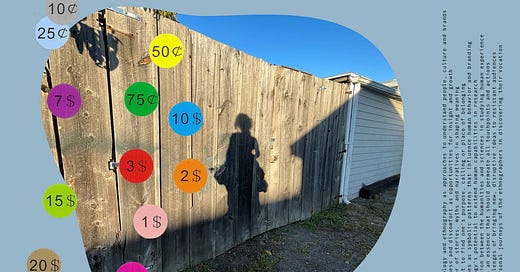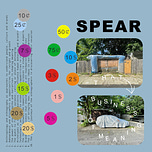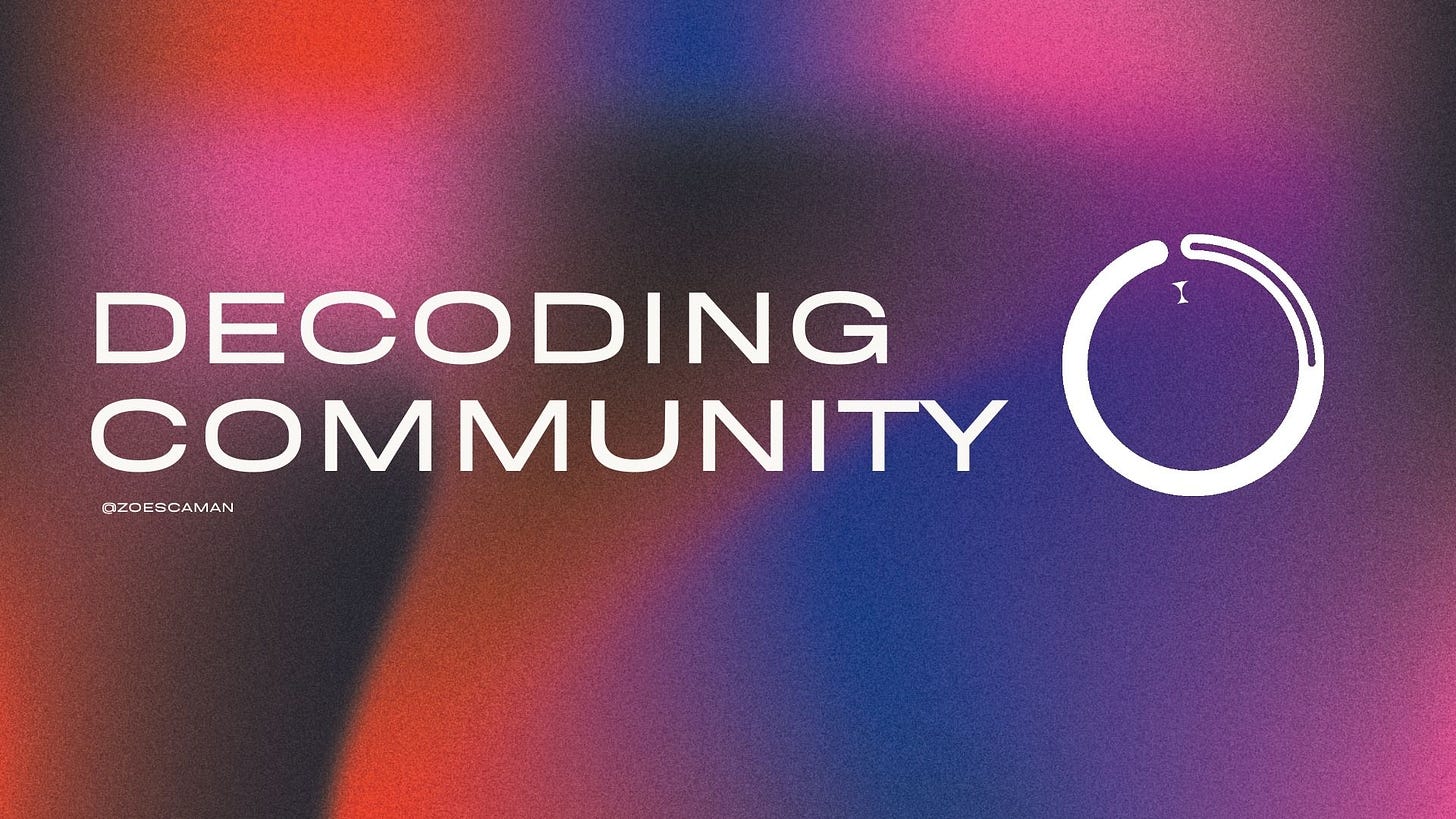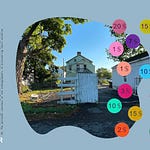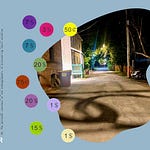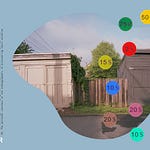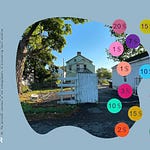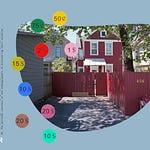Zoe Scaman is the CEO and Founder at Bodacious, a strategy studio delivering bold and audacious thinking. I have followed her for years, and have devoured her work. She is prolific and generous, having published in the past few years an amazing collection of work: The New Fandom Formula, Mad Men. Furious Women, Decoding Community, , The Multiplayer Brand, and Strategy in the Era of AI.
All the interviews, I start the same way with this question I borrowed from a friend of mine. She's an oral historian and she helps people tell their stories. It's such a beautiful question. I always use it, but I also overexplain it because it is so powerful. So before I ask it, you're in total control. You can answer or not answer any way that you want.
So with that, the biggest lead into a question ever, the question is, where do you come from?
I think I come from a mashup of lots of different experiences, positives and negatives. I have always felt other. I've never really felt like I fitted in any of the stereotypes that were assigned to me. I think that when I was younger, that was seen as a flaw. Looking back on it now, I see it as a huge benefit that I've grown into over time.
What, how would you articulate the benefits? What does it feel like to be on this side of that otherness?
I think because you never really fit, it gives you an appetite for exploration of self and of possibility that you wouldn't necessarily have if you felt entirely comfortable in the situation that you'd started in. So I think it forces you to stretch yourself and to have more of a view on what else is out there and what kind of things you can pull together to make something your own, as opposed to just being happy with whatever it is that you're handed.
Tell me a little bit about where you are now. Where are you situated right now? And what are you up to these days?
I'm currently in the middle of the South Downs in a very leafy green West Sussex, which is lovely. I grew up round here and migrated back like a homing pigeon after COVID-19. Bought myself a 16th century cottage and did a big renovation on my own. Then met my partner and now almost giving birth to baby number two, which is very exciting. It's all moved very quickly. In terms of what I'm up to, it's a mixture of trying to keep up momentum with my own brain and the business, and also trying to find a way of slowing down into impending motherhood number two, which is always difficult for me. I know I need to slow down, but I seem impossibly incapable of doing it. And then also just wanting to enjoy my surroundings over the summer. That's what I'm really excited by. I think when you live in such a fast paced industry and world, we don't really stop and quite literally touch grass and smell the roses enough. So that's what I'm hoping to be able to do.
I don't know the area. Can you help me understand where you are? Did you move there at COVID-19? Was it a rural exodus?
Yes, it was. I grew up around here and obviously when you're 15, 16, 17, and you're living somewhere rural, you cannot wait to escape and get the hell out of there. You think it's the most boring place on earth. So I went on a bit of a 20 year road show around the world. I lived in Sydney in Australia for a while. Then I came back to London and then I moved to New York. Then I was in Ethiopia and then I was in Paris. And then back to London. When COVID hit, I was living on my own in London with no outdoor space. It was really lonely. I just thought, why am I here? Most of my clients are virtual. I've got the money, I've got the means. So I decided to move into this tiny little village in the middle of nowhere, which is about two hours outside of London. It's absolutely beautiful, but all of my neighbors are geriatric and everyone thought I was insane because I was in my mid-thirties and moving there alone, but it all worked out. It was almost like I needed to make the shift and then the universe would meet me where I was at, which is a lovely place to be.
How far away are you now from where you grew up? How close?
Probably about 10 minutes.
What's that like?
It's interesting because I think that it's a village that I had never set foot in because it's in the middle of a forest. You wouldn't even know it was there unless you've been there. So even though I grew up in the area, I had never been to this particular village. I feel like I've got the best of both worlds in terms of familiarity of wider place, but also the ability to discover my own place within it. Sometimes when you move back to your hometown, it feels like you've regressed and like you've changed, but the area hasn't. So I needed to try and find that happy medium.
Do you have a recollection of what you wanted to be when you grew up? As a girl in that area, did you know what you wanted to be or have an idea?
I went through the whole stage of wanting to be Britney Spears, wanting to be famous and all that kind of stuff, but I never really knew, to be honest. I don't think I was particularly attracted to any one subject and I didn't go to university. I ended up dropping out of school when I was 18 because I just didn't know. The only options that were on the table that I was aware of at the time were things like business studies and economics. I just thought, do I really want to go and spend tens of thousands, which I'm going to spend my life paying off, on a course that I don't really know I want to do? I just want to get out there and work and see what comes my way. I think I've just been figuring it out ever since.
When did you encounter the work you're doing now? When you think back, when did you first encounter brand or strategy? What was the first moment you realized you could do this kind of work?
I've been doing this for over 20 years. I answered an ad in a local paper. That's how I got my first job in advertising because that was the way that you did it back then. It was just looking for a junior person for a startup agency. It was outside of London. It was in a county called Surrey. They paid me 11,000 pounds a year and I basically just made coffee. But I was in the right place at the right time because it was the era of pay-per-click advertising. So Google taking off and search engines. This company had created a piece of software that allowed you to close the gap between someone clicking on an ad on Google and landing on your website. At the time, that was groundbreaking. I got to go into London and wear a different hat, selling this kind of bit of software into all of these big ad agencies. It was the very first time that I had been exposed to that world. I'd never seen it before. It was really glamorous. It was the early 2000s.
I remember walking into a place called Walker Media, which was famous in London for this woman called Christine Walker, who would sit surrounded by her bevy of other women and just chain smoke in the middle of the office. I remember walking past going, "God, that's so cool. I want to be like them when I grow up." That kind of opened my eyes to this world of brand and advertising. But I think it took me probably a good 10 years in the industry to really wrap my head around what it was and actually what we did.
What's the origin story of Bodacious?
I think pretty much my entire career, I've been looking for a place that felt like home and that felt like I could do a number of different things under one roof. I haven't ever really found it. Probably the closest I came was when I was working at a place called Naked Communications when I was in Australia. It just felt like this crazy chaotic home for brilliant misfits. That's what we used to call ourselves. People that didn't really fit, who weren't the corporate type, who didn't necessarily have a background in advertising, who didn't always believe in brand but wanted to do things differently. It was just this incredible engine of wild thinking. I think some of the ideas that we put out into the world during that time were amazing.
I got there probably the last two years of it being that kind of place. Then there were mergers and acquisitions and it all just went to shit after that. I was really sad about the whole thing. I just job hopped after that. I then left Australia, I went to London. I worked in a couple of different agencies there and nothing felt right. Everything felt like it was narrow and pigeonholed. I was only able to explore one small facet of what interested me.
So I jumped around a lot and I went into client side. I went into innovation. As I mentioned, I went to Ethiopia with Nike Foundation and thought I'll try that because I'd never done that kind of stuff before. I just never found something that really lit my brain on fire. I think all of that hopping around taught me that I was much more of a portfolio player, as opposed to one person who wanted to go on one trajectory.
So I've just got lots of bits that I wanted to hold together. The whole point of Bodacious was to give me the freedom to be able to explore all those different facets, because Bodacious is ultimately me. It's all about where I want to go and where I want to take my thinking.
You mentioned in your experience at Naked that you were people that didn't believe in brand. What's the significance of that?
I think there's a lot of agencies or pretty much predominantly the vast majority of agencies, advertising companies, et cetera, that have this kind of evangelical belief in certain brand frameworks or ways of thinking. They could worship Byron Sharp. They could worship John Steel. They could be all about a certain way of building performance over brand or whether they're entrenched in this idea of brand purpose. But wherever you go, there's always some sort of dominant belief system in terms of what they stand for and what they believe that brand and advertising is all about. I've never subscribed to any of it, to be honest. I'm much more of a fluid thinker in terms of, I'll have a look at what I think might work for any given project, for any given problem. There's no kind of dominating proprietary thing that I'm trying to sell.
I really found that within Naked, they would basically say, we don't have a framework. We don't have a replicable formula. We don't have something that we constantly try and repeat and sell and repeat and sell because every problem is different. They come up with some crazy stuff. There was a pirate radio station in Australia that was shutting down and they were desperately trying to find a way to get funding to keep this pirate radio station going. There was nothing to do with brands. There was nothing to do with campaigns. We put out this kind of challenge to the people of Australia and said, we want you to do some crazy shit to get funding. We're going to leave it in your hands and see what you come up with. There were no parameters to it.
One guy got a boat as far as he could, and then dove into the sea and swam to Necker Island and filmed himself pleading on his knees with Richard Branson to try and give him some cash to keep the pirate radio station going. It's that just crazy, chaotic stuff that came out of Naked because there were no things that we were trying to box things into. I think that when you have that freedom to be anything and be a creative company on all different fronts, I think the work that comes out of that is just so much more interesting.
You mentioned you used the phrase "lit your brain on fire". What do you love about the work that you do? Where's the joy in Bodacious for you?
I think it's the variety. And then it's also the clients that kind of self select working with me. Because I very rarely work now on projects where the output is some form of advertising. Instead it's looking at new ways we could explore commercial models. It's looking at the future of gaming. It's looking at what is an athlete in 10 years time? And how do we start to prepare for that? It's what is the future of music? So it's these big kind of knotty questions that nobody really knows the answer to, including me and the ability for me to dive down different rabbit holes and get excited about research and see where it may lead me.
Are there any touchstones for you, ideas or people that you keep returning to as you, when somebody comes at you with a new problem? I have mentors in my life. There are people I'll bring close if I'm, if I feel a little lost.
I think I've got a quasi board of directors in my brain. They don't know I exist. But I have these people that I turn to.
So I'm a huge fan of Brené Brown, for example, and Esther Perel. I love the idea of bringing more vulnerability and honesty to workplace relationships. I've been a huge fan of Brené since she first came out with her first book. I think Unlocking Us is probably my favorite podcast that exists ever. I just listened to the most recent one with Esther Perel, where she was talking about the other AI and she called it artificial intimacy. I just think that kind of thinking is groundbreaking. So I keep going back to thinkers like her.
As I mentioned, Esther Perel as well. I love David Epstein's work on generalism. For me, that was the very first time that I had the language to articulate the journey that I had been on and the ability to look at my career in a positive light, as opposed to the way that I painted it, that I was unreliable or flighty, or I never saw the light or I got bored too easily.
Michaela Coel is a brilliant screenwriter, actor and director…
Our connection went out for a bit…..
Oh, I was mentioning Michaela Coel. She is a writer, director, actor. She wrote a book called Misfits: A Personal Manifesto. She talked about her initial struggle to fit into the British broadcasting society and production, the way that film works. Then she talked about the fact that she really then embraced that and rejected everything that they stood for and built her own platform.
So I think I lean on different thinkers like that. None of them are in advertising. None of them are in brand. That doesn't really interest me that much. There's probably only one person who I think is doing really interesting work in that space who has moved herself along and that's Heidi Hackemer, who you may have come across. I've known Heidi for 15 years. I did some work with her when she had Wolf and Wilhelmina. Obviously she went to Chan Zuckerberg and then off to Oatly. Now she's doing her own thing again. I've just watched her journey and we've spoken a lot about it as well in terms of finding her passion and her place and what she really wants to do - lean on all the experience that she's had in advertising and brand and facilitation and really make a positive impact when it comes to indigenous communities within the U.S. Actually, how do we go back to basics and learn from their values and their rituals and their practices and bring that old world knowledge into the modern economy and modern world, which is breaking and broken. So I think she's probably one of the only ones that really inspires me in that world, because she has just unapologetically gone after what matters to her.
What is the value of the outsider for the, what do you bring as the outsider?
I think as the outsider, you're less afraid of fitting in, or not fitting in as the case may be. I think you're less afraid of asking challenging, difficult questions and of provoking people and being the provocateur in the room.
Not necessarily being the provocateur for the sake of it, but being the provocateur because you're trying to get to the right question in the first instance. I think if you're not adhering to quote unquote best practice or certain proprietary frameworks or certain methodologies of thinking, it just frees you up to be that kid at the back of the classroom going, "But why are we doing this? Why are we doing this way? Is there not a better way? Maybe I'm wrong. I don't know. Let me ask the stupid question."
But that's always been me. I think that in agencies, not all agencies, but in agencies that I've been in, it's been like, "Shut up. You're supposed to be the smartest person in the room." And I was like, "I don't want to be the smartest person in the room because then who am I learning from?" That's not going to work for me. So I want to make sure that I'm always trying to expand and progress and connect to people who are three steps ahead of where I am in whatever field that they're in, and then I get to absorb from them, which is such a wonderful place to be, I think.
So you reject the invitation to be the brightest person, the smartest person in the room, and you choose instead to become - what's the position you take in that room?
It's the person who's asking all the damn questions. You assume they're dumb questions, but actually in many cases, they're not because there are other people in that room who don't know the answer and who would love to ask the question, but don't want to position themselves as being the one that doesn't know.
I've never felt like that. I've always felt very comfortable raising my hand and saying "Call me stupid, but" and then introducing a new aspect. Sometimes it is a stupid question, but sometimes it can open up brand new conversations, which everyone's like "Oh, actually we hadn't thought about it in that way."
So I think that's always the position that I want to play is just thinking, how can I dig a little bit deeper? How can I go left of center? How can I be more abstract? If I can do all of those things, is that going to then open up something else or lead us in a different direction?
It's the power of the stupid question is what you're talking about, right?
Yeah, I read about, I've completely forgotten his name, but there's a Harvard professor, I think he published a book in which this was a thing where he called, there's a brainstorming practice that he has called a question storm. I love it. I've practiced it a few times with clients and the idea is that you come into the room and you're only allowed to ask questions. You're not allowed to offer any solutions. You're not allowed to dig further into an initial question that you've asked. You just have to ask questions constantly for about 15 or 20 minutes. Once you think you've got the questions out of you, then you go back to the questions that you've written and if you can write them a different way.
The whole premise of that is the best work, be it innovation, be it whatever direction you want to go in, comes from asking the best question. Often we skim over that completely and we jump into solutions because we find that easier, but then we don't know if we're providing solutions to the thing that we need to.
So if you're spending 15 to 20 minutes with really smart people in a room, reframing the question a hundred times, then you might get to a better articulation that can again, open a door that you hadn't expected previously.
What's your experience trying to open that space in the rooms that you're in, the teams, the clients? Is it difficult to do that?
It can be. I think it's getting easier for me over time. I think when I very first started doing it, I was in agency land and I would sometimes get shut down. I would get told "Don't ask such a stupid question." Or again, as I said, "You're supposed to be the smart person in the room. Don't make yourself look like you're ignorant in any way." I was young, I was impressionable. That made me crawl back into my box and kind of shut myself down.
I think as I've gotten more confident with my own practice, I will push it. So if a client says, "Oh, I don't think we need to go down that route," I'll go "No, actually I'd really like to spend 10 minutes just exploring this space." Or if they say "We've already answered that question," I'll say, "Okay, but I don't feel like I've got the answer to that. So if you could explain it to me again." Just finding ways to navigate first of all, the kind of dismissal that you get because it's not dismissal from a negative standpoint or from a mean-spirited standpoint. It's just that they want to fast track again towards a solution because that's a natural avenue for many of us to want to go.
But I think if we can just spend some time really working through those conversations in those areas, they may well lead nowhere, but I think it's worth the energy. So now I feel less pressure to conform in those situations. I feel much more comfortable kind of pushing that agenda because I also know that ultimately the buck stops with me in terms of whatever this output is going to be. So I should have more autonomy in navigating that process.
Tell me a little bit about the thought leadership, the work you've been doing on fandom and multiplayer brand. It's just been amazing. It's unbelief, it's very prolific and smart. Was that a, how did it come to be that you would start doing this kind of thought leadership and what's that experience been like?
I think it started a while ago. One of the very first pieces that I wrote, I think I was at Undercurrent actually in New York. Undercurrent doesn't exist anymore, but it was a quite experimental, non-hierarchical, organizational design company. It was all about teal organizations and what happens if you remove layers of hierarchy and you go into kind of slam teams and different ways of working.
I loved it to a certain degree, but I also felt that it was very sterile. It almost took human beings out of the process and over-engineered it to the point that I actually needed to have a glossary at the back of my notebook to know what the fuck anyone was talking about on a daily basis.
It was a lot of super, super smart young people that they had hired from some of the top universities across the U.S., who had no emotional maturity, really, including myself. I think that we were going into these organizations - PepsiCo, American Express, Al Gore's Climate Reality Project - and we were like bulls in a China shop because we were not listening to people. We were not listening to the reality of an organization, which is made up of people. When you go into a company and you go to someone who's been working in a department for 20 years and you say "We're going to take away your team. We're going to take away your title and we're going to take away your remit, but don't worry. You get to work in a slam team now" - that's obviously going to piss them off because you are taking away all of the ways that they have defined their success in their progression. We just didn't get it.
I think that we were genuinely shocked when people would dig their heels in. So I started really, this is when I started reading into Brené Brown. This is probably about 10 years ago. I really started to get this idea of empathy and vulnerability and understanding individuals' ways of thinking. I wrote an article called "The Importance of Empathy within Organizational Design". I tried to get it published to Undercurrent, but they were not interested. They didn't think that it mattered at the time. So I self published it. I put it out onto LinkedIn and it did really well.
A lot of people came back and said, "Yes, this is what's missing. We're looking at these kind of progressive organizations that demolish hierarchy in favor of these new ways of thinking, but we're not thinking about the people. We're turning organizations into chess boards and it's not working." That's why it's not working. So that was the first one.
Then when I was at Droga, I wrote a gigantic long piece on the importance of diversity. This was in 2016, and it was thoroughly researched, took me days and days to put together. I went to Droga, and I said, "Can I publish this under the banner of Droga?" Absolutely not. They didn't want Droga to take a point of view on diversity. They certainly didn't want it coming from me. So no, if I wanted to publish it, I could do it on my own, but they weren't going to help me get it to Campaign Magazine or anything like that. So I self-published it. Cindy Gallop got hold of it, pushed it far and wide. Then Brad Jakeman, who at the time was the CMO of PepsiCo got hold of it as well. He was like, "This is brilliant. Love this thinking."
Then obviously Droga were like, "Oh, Brad Jakeman, the CMO of PepsiCo quite likes it. Zoe, can we take this and put it into Campaign Magazine under the banner of Droga?" And I said, "No, you can't." So again, I just learned this lesson that I needed to self-publish and I needed to have the freedom to be able to share my voice the way that I saw fit. Because every single time I tried to take my ideas to a company, I was pushing against a brick wall trying to get them to believe me or understand me or actually want to support my initial point of view, yet it was constantly being well received externally.
So I just kept on going after that. Obviously I wrote "Mad Men, Furious Women". I did a piece on "Breaking our addiction to non-fiction". So actually saying that creative people need to read more novels and fictional universes because everyone was getting obsessed with these brainy books that were actually killing our way of thinking. I said I would rather spend an evening reading Harry Potter than I would a book about strategy and planning. I don't think I've ever read a full book about strategy and planning. I thought that was important.
Then it just progressed and then I started not necessarily writing just articles, but I started writing almost quasi-talks/presentations, which were a way of me communicating a new idea or something that I thought was evolving or shifting that was interesting. So I did "Fandom: The New Fandom Formula", "Decoding Community", "The Multiplayer Brand". I've just done "Strategy in the Era of AI". I've got two more in the works as well, which is exciting.
I was politely invited to answer questions about the role of qualitative research in the age of AI, and I've gotten lost. What is the humanist argument for how we learn when AI is sitting there and it can be intuitive, generative and imaginative. Anything that you say about us, what we do with each other, I can find somebody who says this is possible with AI also. What do you think?
I don't think it always is. I think that AI at the moment, if we're being generous about it, is a knowledge aggregation platform or knowledge aggregation system. So essentially it's drinking the entire internet and then regurgitating it in a way that uses predictive sentence structure to make it feel like it is human or conscious or helping us in that way.
I think that there is a huge amount of value to the ability for us to use knowledge aggregation engines in terms of moving us faster in certain instances, uncovering knowledge that we don't have, upskilling us in new categories, like all of that is great. But one of the big things that we have that I hope machines will never have is that ability to connect to one another and to have real complexity and nuance and challenge in the way that we are building relationships with each other and the way that we communicate and the way that we interact with the world and the way that we see it and move through it. AI doesn't have that ability yet.
We're still talking about AI potentially coming into having its own body. That's a conversation that is live at the moment. We're saying the only way for AI to evolve is for it to have a relationship with the real world in the way that we do. But even if that's the case, even if it can touch and it can feel, and it can hear and it can converse, that kind of myriad of complexity and emotion and messiness that makes us uniquely human - I just don't see that ever being translated into a machine.
That's where the richness of qualitative research comes from - you have these in-depth conversations with individuals who have had fundamentally different life experiences, which have given them whatever it is that they are leaning into today. That's their own version of wisdom, that's their own version of life experience, and that makes them fundamentally unique in their opinions and their view of the world. If you're using AI to do that, you're going to miss out on all of that wonderful detail.
What is the role of qualitative? What's your relationship with qualitative? Is it something that you use or what's your relationship with, how do you use research?
I've actually just finished a massive research study, which is coming out next week, which was with children. It was with the Walton Family Foundation who obviously own Walmart, but they've got a huge foundation in the U.S. and they're one of the biggest spenders on educational philanthropy. They came to me about a year ago and said, "If you could study anything, what would it be?"
I said, "I am fascinated by the changing landscape of how children are self-educating using games like Roblox and Minecraft. If you think about where gaming has been for the last two decades or so, gaming has been an escape. It's been a way for us to pick up a controller and put it on our television screens and to play a narrative, which takes us out of our everyday. But what's interesting about these new games and platforms that are coming up where the vast majority of under 13s are spending their time is within Roblox and Minecraft. You're not embodying a narrative necessarily that somebody else has built for you, you're actually creating as part of your play."
So if these kids are creating, and that is the way that they are playing these different environments, what does that mean for the way that they're educating themselves and actually for the experiences and expectations they're going to have as they age up?
We undertook this massive research study across the U.S., so about two and a half thousand children with a bunch of qualitative interviews as well with parents, children as young as five, as old as 13. We chatted to them about all of this stuff. The original hypothesis that I went in with, which is gaming is potentially helping with kids learning different subjects - where we got to was completely different.
What we found was that there is now proper evidence to suggest that children are being cognitively developed via these games. These games are character development playgrounds. They actually help them with perseverance, with resilience, with collaboration, with their creativity, 21st century lateral skills. So while they're not teaching them biology necessarily, or individual physics lessons, or adapting to the curriculum, they're teaching them much more expansive skill sets, which are going to be desperately needed for a work world that is completely uncertain. We have no idea what jobs are going to be around in 10 years, 20 years.
These kids are learning that level of kind of lateral thinking alongside the character development pieces within these games. Some of the interviews that we had with the parents and with the kids were just fascinating as a result of really delving into that and being flexible about where the conversation went.
I think that's the biggest lesson for me with research, and I'm actually about to start another massive project into youth sports, which is looking at the same thing. We start with one hypothesis, but we're not fixed on that hypothesis. We're actually saying if there's something interesting that comes up in the research in the early stages and we want to pivot, let's pivot because that's the whole beauty of it - you have no idea where it's going to take you.
If you try and use research as a way of doing a kind of Q&A with your own thinking, you're not really letting go and really getting into the exploration side of things. I think that's where the richness is.
It's beautiful. I was taught that people have experiences, not answers. Very often the research industry, we treat people like answer machines, and we're very willing and very good at providing the answers that we think people want. But it's much more interesting to just get lost in the experience and figure out what it's like.
Exactly. I think AI can do the Q&A stuff. If you want to, you can turn to AI and synthetic users and you can say, "I want to do some quant research on kids who like to surf in Southern California." It will probably give you something that's 99% accurate if you're going to do quant.
But it won't give you the really rich insights and experiences that you were just mentioning. I think that's where we need to spend more energy if we can.
I asked Claude for some questions to ask you. I fed some of your stuff and it's so, I'm going to try out a couple of those and we'll see how...
I don't think I've been asked any interview questions by an AI before. This is the first.
Let's see. There was a number of them. They were good. So with community becoming a bigger imperative for brands, how does this change the skill sets and capabilities needed within agencies? What new roles or departments might be required?
I think it's a huge overhaul, to be honest. I think agencies have been teaching their staff for years and years how to be sausage factories. We get a brief, we go through the same formulaic process, we waterfall it down to creative and then production and then project managers. We produce a bunch of assets that people scroll past in two minutes. Then we repeat the whole process all over again, and we call that a successful business model.
I think that is short-term, disconnected campaign thinking. That's what we've been trained to do. When you're looking at the future of community for brands, that is long-term reciprocal relationship building which is much more embedded in the day-to-day activities of a brand. The skill sets are like night and day. We just simply do not have the ability to understand where to even begin on that front.
So I think that it'll probably start as every other piece has started, whether it's search engine optimization or PPC or social media or whatever. There's going to be a bunch of shops that are set up outside of the norm to actually cater to this. Then over time, they're going to be sucked into the big holding companies. That's how it's always been.
A second synthetic question. The research dives into various forms community can take - from subcultures to fandoms to collectibles and more. How can qualitative research be leveraged to map the community landscape around a brand and surface new opportunities?
I think that's a fascinating area that not enough attention has actually been paid to, which is this idea of kind of community mapping. I did a bit of it for a project that I did year before last with Axe and Lynx, so the Unilever body spray. We looked at what are the adjacencies to the brand?
We thought hustle culture is one, comedy is another one, anime is another one, rap is another one. Then actually how do we look into each of these different adjacencies and say where are the different sub-communities and subcultures within these different areas?
<snip>
But again, you have to almost do the manual research. When we tried to go through a normal research company, which was much more quant focused, they came back and they were like, "Yeah, people who like basketball also like plants. You should look at plants." We were like, "What the fuck is this?" There was no real insight or intelligence driving it. It was just data for data's sake, but they hadn't analyzed it and they hadn't actually said, "Is this even worth saying in a meeting or even worth bringing up with a client? Because is it going to add to the conversation?" It didn't and it was a complete waste of time and energy.
So we went back to desk research and manual mining of information and connecting those different dots. That's what created the richness of the ecosystem that we made in the end.
We've got just a few minutes. I guess maybe one big question just came to me and just thinking about the reports that you've put out - subcultures, right? Niches, the rise of niches and fandom and the multiplayer brand. There's a way that for me, it reminds me of, I had a boomer as a mentor and he would always talk about, he grew up in a binary world and then, and it's just like this, the fragmentation is this sort of natural process of the marketplace, it seems to me. It's what gives birth to brands or brand opportunity as a very, at least that's my elementary understanding, or idea of it.
To what degree do you think that's the case, that fragmentation is just how things work? Then, what does it mean to be a multiplayer brand? Is that what your, is that your diagnosis? Or, am I understanding you correctly, I guess is my question. Then, where does the multiplayer brand, what comes after the multiplayer brand, I guess is the question.
I think we are in an era of just increasing fragmentation. I don't think it's new as you said, I think it's been happening since the advent of the internet and arguably even the printing press. What we're actually talking about is the proliferation of user-generated tools. That's what drives fragmentation.
When people got the printing press, suddenly you had more people able to publish their opinions and distribute those opinions with different groups of people who may or may not agree with them. Then we had radio and suddenly there was an explosion of different radio stations and again, different voices, different opinions, different genres of music. We had the television and so on. Obviously all the way through to the internet. It's just a constant push towards more niches, towards more subcultures, towards more varied voices, and towards more power being in the hands of just everyday people. You can spread those opinions and those ideas and find other people who belong in their tribe.
What I've been calling at the moment is the kind of third phase of internet-based UGC. We started out with when the internet first came around, we had forums. So we had people kind of writing blogs, for example, and we had people playing weird spin-off Dungeons and Dragons games on these obscure forums and Club Penguin, all those kinds of things.
Then we moved into UGC phase two, which is where we've been for the last 15 years or so, maybe a bit longer. That was the advent of YouTube and TikTok and Instagram and that burst influencer culture and you had the kind of famous saying, I can't remember who said it, that YouTube would never take off because there was a certain amount of people who were still in the closet with a little bit of talent. Obviously that was completely bollocks and everything exploded from there.
Now we're moving into this new era of UGC, which is basically democratizing it even further by giving people access to incredibly powerful creation tools like Unreal Editor for Fortnite, Roblox Studio, and also the advent of AI, which means that actually that gap between idea and manifestation has closed to almost nothing because I don't need to know how to code now to build a website. I don't need to know how to produce a television show to create an animation. I don't need to know how to, I don't know, for example pull a bike apart and put it back together in a different way, I can just ask ChatGPT for instructions.
That ability to reduce that friction down to almost zero is then going to birth a brand new version of UGC and what people are calling it is UGGC, so user-guided generative content. That's just going to mean that we've got a proliferation of just stuff. A lot of that stuff's going to be shit, but it's also potentially going to birth brand new genres and subcultures and fandoms and all that kind of stuff.
Think about the power of a fandom. For years, we've had fandoms creating fan fiction, spin-off characters, different ideas with particular characters. The very famous Trekkie one where Captain Kirk and Dr. Spock are secretly in love - that's been going for decades. But now imagine the ability for a fandom to train an AI. Suddenly you have the ability to generate brand new character tangents, different storylines that may or may not have existed previously. It's just turbocharging their creativity, which I think is amazing.
So I think that fragmentation is just going to continue. I think that the reason the multiplayer brand idea then came about was I was just thinking about the power in people's hands, the tools that they have at their disposal, but also their newfound expectations for how they want to interact with IP that they love, with brands that they love, with worlds that they love. They want to be a part of it and they want to be a part of it to the point of not just participation, but active navigation and contribution. They have the tools to do so.
Again, I'm looking at the Generation Alpha research that I've got coming out next week and these kids are tinkerers. They're coders, they're making toolkits. 25% of the kids that we interviewed who are under the age of 13 are actively selling their virtual creations on Roblox marketplace. It's crazy.
You take all of that together and you look at this generation who have been trained on creation tools as their form of primary play, all of these other tools that are starting to close that gap between idea and manifestation by reducing all of the hurdles of friction. Suddenly you go, what relationship do they want to have with these brands? Are they going to be happy just to be given a sneaker that Nike has made? Or do they want the 3D files so they can create their own and 3D print them in their houses? Or do they want to create their own spin-off characters for LEGO? Or do they want to parachute themselves into a personalized story within the Pixar universe and actually decide where that navigation then goes in terms of narrative and storytelling and character arcs?
I think that's the answer. I'm not necessarily saying that every brand lends itself into multiplayer. There's a certain amount of multiplayer stuff that a toilet paper brand could do or toothbrushes, for example. But I think for the vast majority of brands who operate in entertainment, in sport, in apparel, anything like that, we're starting to see the need for them to open up to a certain degree, not everything, because I think if everything is open, you don't have a brand. You still need some control and parameters around it. But how do you really start to open up and allow people to come on in and mess around with your IP within certain guardrails, but giving them that permission to co-create.
I think one of the biggest moves that I've seen recently which has got me really excited, is the newly announced partnership between Disney and Fortnite. Disney is building this absolutely massive map that covers every single one of their IPs within the world of Fortnite. Which not only makes their IP playable, but also if you start thinking about Unreal Editor for Fortnite, and the ability that Fortnite has given all of the players to create their own islands, characters, aesthetics. Then you overlay that onto Disney and the actual trailer for the partnership did talk about co-creation for the very first time. Disney will let people potentially play with their IP. That's a huge shift that we've never seen before.
I want to thank you so much. You're so generous with the thinking that you put out there in the world. I really appreciate you sharing your time and your thoughts with me now.
Of course. Thank you so much for having me.


